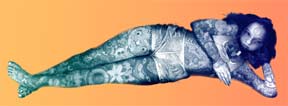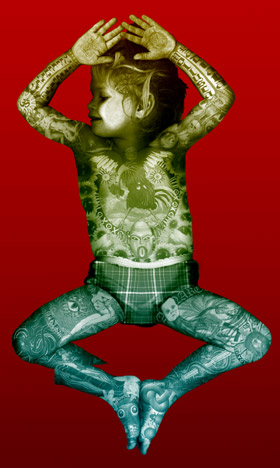James Cobb
Curated by Jimmy Santiago Baca
December 4 – January 24, 2004
James Cobb began his real interest in visual art making flyers and posters for the bands he was drummer in during High School. He continued to casually make images during the decade following High School, but had no real interest in "art" until his wife-to-be, Rhoda Mappo, introduced him to "Mail-Art" in the late 70s. She was very active in that scene and had been for some years. Cobb was inspired by the global underground network and for the following five years or so devoted all his free time to corresponding, creating images, networking, and visiting many of the artists worldwide that were part of what they all considered to be a "movement". Cobb participated under the names Nunzio Mifune, the Six-Fingers Club, created many music tapes such as Six Fing Thing and put out an obscure, convoluted Xerox machine, the Mambo Press Update. Eventually he developed a sophisticated spray-paint stencil style for the use in creating multiples for small global distribution to like-minded folks.
Towards the mid 80s, Cobb began to realize that a) he wanted to create images more complex than stenciling would allow and b) since he was spending all his free time doing this work he ought to explore options such as the more mainstream gallery scene (where he noted people actually bought and sold images… even strange images). He began the process of teaching himself how to paint with oils. Checking out coffee table art books from the library and buying all the materials he might need, he embarked upon his career as an artist, exhibiting his work all around the country.
Cobb has veered from painting full time to creating digital imagery and musical / audio pieces at his digital home recording studio under the name of "Six Fing Thing". He is also playing soprano sax in the musical aggregation "Pseudo Buddha" based in San Antonio, Texas
Jimmy Santiago Baca was born in Santa Fe, New Mexico in 1952. His awards and honors include the Wallace Stevens Chair at Yale, the National Endowment Poetry Award, Vogelstein Foundation Award, National Hispanic Heritage Award, Berkeley Regents Award, Pushcart Prize, Southwest Book Award, American Book Award, and the International Prize.
Swept up in the narco-police madness that swirls in the barrios and ghettos of America, a nearly illiterate Baca went to jail in his early twenties and served hard, flat time, with no parole. Five years later, he emerged from prison a voracious reader and a skilled self-taught writer and went on to become a passionate and critical voice for Contemporary American Poetry.
Baca is the author of A Place to Stand, a memoir, and numerous books of poetry, including Healing Earthquakes, Black Mesa Poetry, Martin and Meditations on the South Valley, and Immigrants in Our Own Land. CD's include Healing Earthquakes, Strike Zones, 13 Mexicans and Defiant Reaction. Movie scripts and productions include Bound by Honor (Blood In, Blood Out), Disney Productions, and The Lone Wolf - The Story of Pancho Gonzalez, HBO Productions.
ARTIST'S STATEMENT
I had been using tattoo-like images in my paintings for years as a means for creating another layer of visual information, another level of narrative, and I though it would be interesting to load full-body scans of children with this kind of information. They were fun to work with. I rigged up a low platform on the floor of my flatbed scanner. The long, SCSI board, the blanket laid out on the low planks, the concrete floor of the studio, the whole set-up looked like some kind of dangerous back alley medical device and was a bit intimidating. One girl, eyes wide, refused to participate even though her Dad pleaded with her to do it. I had to humor and soothe. The smallest of the children had to have his parents lying on either side of him while I was scanning so that he could be brave enough. None of them liked having their faces scanned with the towel over their heads. My daughter seemed to openly defy the scanner by staring it down. Most of the kids' parents are friends and the children are used to doing "weird" things for their folks now and then. Two of the kids are mine.
The audio project gave me a second and very different opportunity to work with these kids. I recorded them talking with my wife, Rhoda Hockett, with their finished image as the conversation piece. This time, instead of having a collection of images with which to "build" their illustrations, I had a collection of phrases, sentences, noises, the children's own thoughts, with which to build an audio piece. Ultimately it became clear to me that most kids don't like clowns.
With all my work, I try to evoke a sense of the universal good at the core of things. For me it works best when the viewer / listener finds him or herself perceiving the truth in imagery or sound and music that they might be surprised to be drawn to.
CURATOR'S STATEMENT
by Jimmy Santiago Baca
On James Cobb's Work
Almost as if the heavens opened up
on a morning when folks were all going to work,
a family waits at the bus stop,
dogs nearby, baby in arms of wife,
man with a steady eye on pedestrians
normal,
when a whisper showers down from heaven
in the form of black leaves
and they scatter over the red streets
of a New York or New Mexican morning
and somewhere in Texas
a lone runner jogs on a sand dune
like a black stink bug
scales the edge of concrete block fence/
running to stay alive
running to live longer.
Mix it up,
take no safe refuge in the gentle strings of the cello
let's take a red neck hick munching a green chili burger
guffawing at the monstrous hurricane
as if it were a mere lamb lost from its flock--
Scatter it! Blow it!
Mix it up!
Growing in the infant's eyes
are maddened bull elephant's cries,
beneath the calm exterior of suited business man
his smile gentle as a giraffes grazing on a reserve or zoo
trough greens,
we hear his soul
a guzzling
down deep burbling toxic flushing
where voices squabble in a maddened hysteria
over crumbs of bread.
Babble, chaos, mob-rioting
in the midst of which
we hear a gentle flute, a clarinet
a spider weaving its web
much the way Miles Davis braided notes on the night air,
Mix It Up!
Don't believe the lies,
don't believe the revolution is coming
don't believe the words of love
don't believe the killing will stop,
don't believe children will not die of hunger or AIDS,
don't believe in dreams
it's all nightmares
and naked cries sailing through broken tenement windows
and a few good souls below on street corner
handing out pamphlets on salvation.
Mix it up the way a mother slowly stirs in pancake batter,
the way a junkie mixes heroin and cocaine into the spoon
and boils under a blue flame
his soul buzzes around like a fly or moth to flame
singing it wings.
Mix it up the way boots of foreign occupiers
sounds at night on stones,
whole battalions marching heel to stone
clack clack clack
mix it with a woman's whimper,
with a president's lie,
the droning of a TV constantly
in the background grinding our brains to dust
MIX IT UP!
And so I enter Mr. Cobb's work,
those blue faced, tattooed children, the biblical betrayals,
picking their teeth with gut-tendon from a lamb just barbecued,
snapped chicken bones writhe in agony in dogs jaws---
don't fucking let the teacher teach,
don't listen to your parents,
because what we see isn't there,
what we hear isn't the truth,
what we're told is a lie,
what we touch vanishes,
what we taste is poison
what we love is killing us,
so MIX IT UP!
That's what the heavens promise me on this day
painters in a thousand studios mixing it up...
and some homeless man in the brain
now crosses his legs and strum his banjo
trying to find a tune to sort it out,
to sing a celebration for our madness,
exploring the notes
in hopes somewhere he'll find a child
walking through the smoke, through the dead cranes,
hoping that child still remembers how to speak
how to love
what compassion is....
_____________
in his work,
minds
View CATALOGUE




